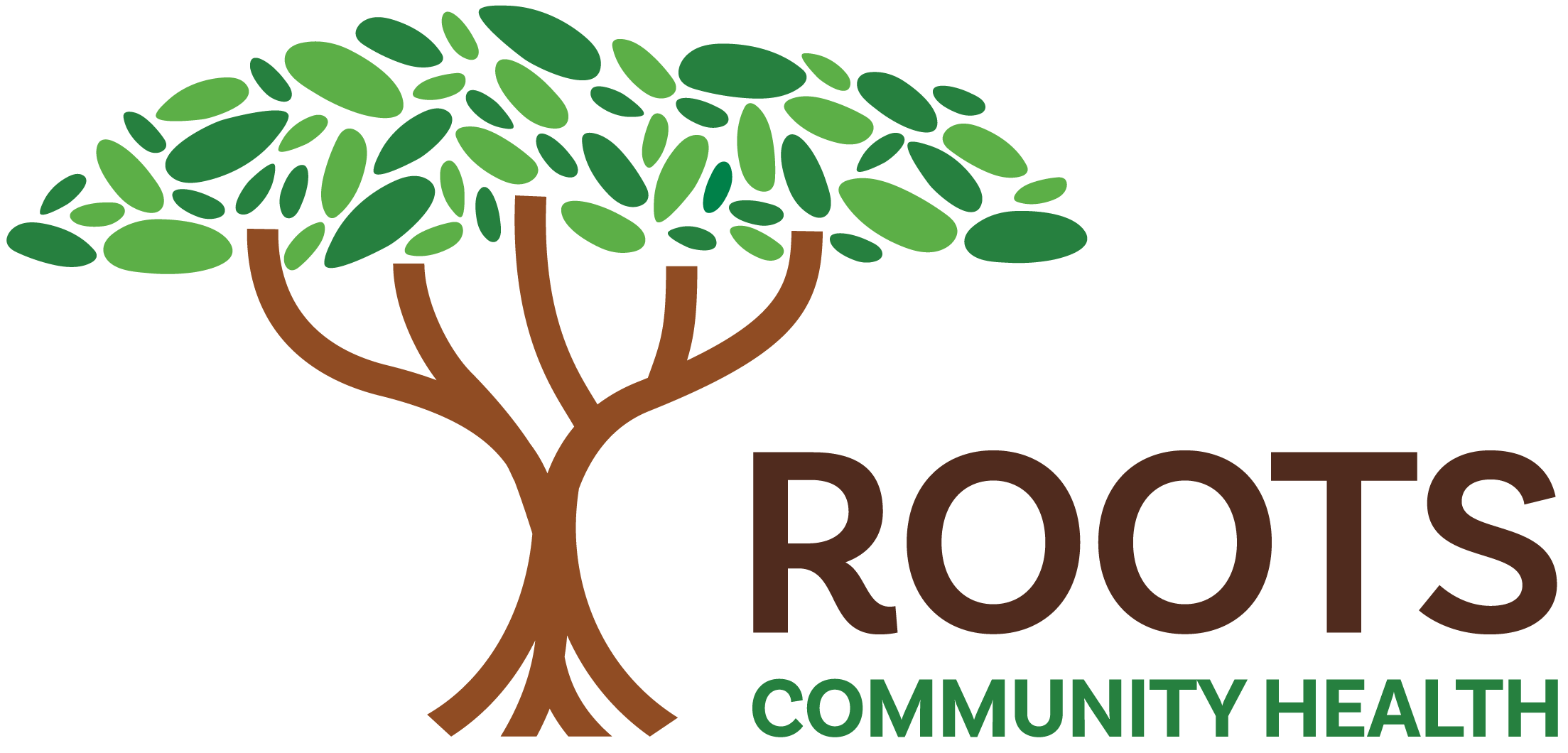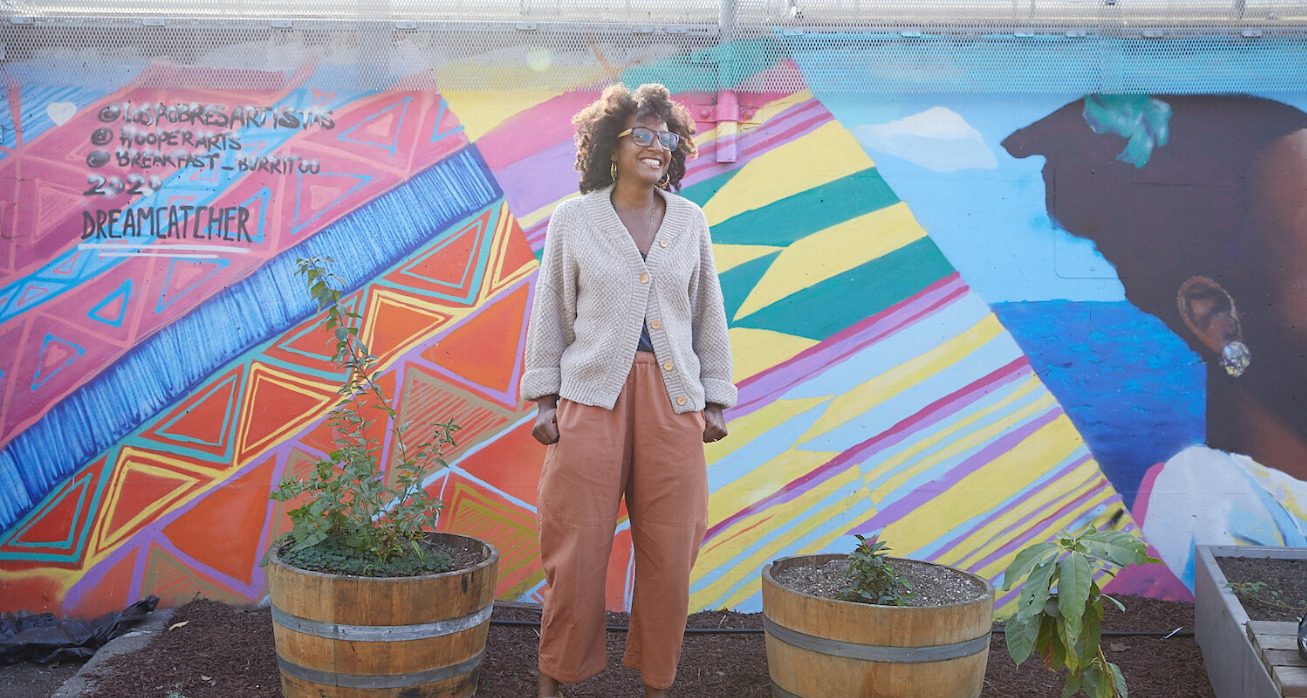Dr. Aisha Mays unveils Dream Youth Clinic’s new Community Garden—where opportunity grows for vulnerable Oakland teens.
Written by Melissa Hart
Dr. Aisha Mays of Oakland grew up knowing she wanted to be a doctor, but she never imagined she’d invite a pregnant 16-year-old to live with her during medical school. She’d been volunteering as a mentor for high school students of color, and the program paired her with a teen who became pregnant three months into their work together. “Her parents kicked her out, and I found myself mentoring this sixteen-year-old who had nowhere to go,” Mays says. “She moved in and lived with me my first year of medical school, and into my second.”
The experience gave Mays a powerful insight into what it’s like to be a young person without support. Together, she and her mentee figured out doctors’ appointments and housing and insurance, and eventually, the young person moved in with family in another city. “That’s when I began to really think about vulnerable young people,” Mays says. “We withhold assistance, but we expect them to thrive, and then we report statistics about their failures without providing support. That lit something in me.”
“We withhold assistance, but we expect them to thrive, and then we report statistics about their failures without providing support. That lit something in me.”
She worked as medical director in Oakland’s juvenile hall and saw first-hand the youth affected by what she calls “intersectional vulnerability.” “Sex trafficking and homelessness went hand in hand,” she explains. “If youth lived on the streets, someone would solicit them, and then they’d be arrested for prostitution. They’d land in juvenile hall, and I’d meet them in clinic where they’d tell me about their exploiter—usually a boyfriend or girlfriend, and transactional sex was their contribution to the relationship. No one in the medical community were talking about how to support them, how to connect with community organizations to create a safe space for young people being exploited.” Between January 2011 and September 2016 The office of the District Attorney in Alameda County identified 518 youth that were exploited or at risk of exploitation. But those numbers likely don’t come close to estimating the full scope of the problem. According to research done by Danna Basson for the WestCoast Children’s Clinic, despite growing awareness of the issue, it is poorly understood and difficult to recognize. As a result, 75% of young people who experience commercial sexual exploitation endure multiple years of abuse before anyone intervenes. This problem remains hidden for several reasons, one being that the trafficked youth often don’t recognize their own exploitation, so the majority do not seek help. In 2009, the FBI designated thirteen High Intensity Child Trafficking Areas in the United States—The Bay Area is one of them.
So Mays began reaching out to agencies in Oakland with the goal of creating health resources in the spaces youth were already accessing. When leadership at When leadership at Dreamcatcher Youth Services invited her to establish a medical clinic in their new building, she enthusiastically agreed.

Dr. Aisha Mays, Founder, Dream Youth Clinics at Roots Community Health. Photographed by Jen Siska.
In 2017, she became the founding medical director of Dream Youth Clinics, the youth sites of Roots Community Health, which serves Oakland’s most vulnerable adolescents dealing with the repercussions of homelessness, foster care, sex trafficking, and the juvenile justice system. Responding to the health care needs of young people, the Clinic incorporates visual art, music, technology, and now, gardening.
Last summer, Mays and one of the unsheltered youth in her care planted okra, tree collard greens, and tomatoes in her clinic’s new youth community garden created in the midst of the pandemic. Mays—director of Adolescent and School Based Programs at Roots Community Health and founding medical director of their youth sites, Dream Youth Clinics—found herself inspired by the young person’s excitement at the prospect of helping peers to transform the vacant lot beside the clinic into a vibrant, healing space full of vegetables, herbs, and fruit trees.
“This youth, feeling very disconnected and far away from family, told stories of their grandmother and aunt gardening in their backyard,” Mays says. “The young person was really excited about installing different types of soil in the garden beds, and came to every planting day full of enthusiasm. I was so inspired by them. The way that they responded to and interacted with the garden is exactly what I envisioned when we began the project.”
“Health is everything. It’s not just going to a clinic with four walls to see a doctor for a physical exam. It’s how you interact with your friends, what you put into your body and how that makes you feel, what music you listen to, what parts of your life excite you. Our garden is health.”
The community garden, coined the “outdoor clinic,” is the newest project and clinical site at Dream Youth Clinic, which Mays founded in 2017 to serve Oakland’s most vulnerable adolescents dealing with the repercussions of homelessness, foster care, sex trafficking, and the juvenile justice system. Youth help to shape each aspect of the clinic. The garden represents a partnership with their co-located agency, Oakland’s Dream Catcher Youth Shelter, and Planting Justice.

Dr. Aisha Mays, Founder, Dream Youth Clinics at Roots Community Health. Photographed by Jen Siska.
“We consider the garden our outdoor clinic,” Mays explains. “Health is everything. It’s not just going to a clinic with four walls to see a doctor for a physical exam. It’s how you interact with your friends, what you put into your body and how that makes you feel, what music you listen to, what parts of your life excite you. Our garden is health.”
Mays asked the clinic’s youth focus group to envision possibilities for the 20-by-60-foot lot located in their cul de sac on a blighted slice of land in between BART and the freeway. “We thought it would be a great space for our young people to be able to build something that they care about,” Mays explains. “Our youth in shelters live such transient lives. I want our garden to be a visible anchor of stability—a space they can tend and relax in and bring friends to.”
“Our youth in shelters live such transient lives. I want our garden to be a visible anchor of stability—a space they can tend and relax in and bring friends to.”
Dozens of volunteers gathered to clear debris, remove toxic soil, and spread gravel paths. Local businesses donated lumber, planter boxes, and hundreds of starter plants. Apple designed a rainwater catchment gazebo, pro bono, which volunteers built with donated materials. NorCal Resilience Network provided volunteers and funding so each youth could receive a $20 stipend for assisting in the garden.

Dr. Aisha Mays, Founder, Dream Youth Clinics at Roots Community Health. Photographed by Jen Siska.
Young people designed a mural and assisted Oakland’s Los Pobres Artistas in painting a majestic art piece on a wall that borders the space. In one panel, a Black girl closes her eyes to make a wish after blowing on a dandelion; its seedpods drift over a sparkling ocean. Another panel shows two women elders cooking and providing food to the community beside a giant blue heart surrounded by colorful geometric patterns.
Mays recalls the part community gardens played in her own life in Brooklyn after her residency. “So many people don’t have their own outdoor space there, so gardens are a really important thing. I sought them out as a space to be outdoors, and also to create something with community,” she says. “When I came back to California, I wanted to live in that green space again. I just love the process of creating something that grows. You care for it, and it feeds you and you feed it. It’s a reciprocal, beautiful relationship.”
“ I just love the process of creating something that grows. You care for it, and it feeds you and you feed it. It’s a reciprocal, beautiful relationship.”
She and young people gathered in protective masks or face shields on the first official planting day in late spring—an opportunity for everyone to spend time outside during Oakland’s shelter-in place-mandate. “We were told to say inside or go into the backyard or go for a hike,” she says, “but think about the young people who don’t have a permanent home to call their own, or kids living in concrete housing without a backyard or access to hike in the hills. Planting days offered us a way to be together in our ‘backyard,’ in somewhat of a structured way outside.”

Photographed by Jen Siska.
The climate in Oakland enables year-round gardening. That first day, youth filled boxes with soil and tucked tomato and basil starts into the dirt. They devoted one large bed to succulents, and created an orchard in which they planted several fruit trees, as well. They harvested the last of the summer crops in November, then planted kale, okra, lettuce, carrots, winter herbs, and rhubarb. “A lot of our young people didn’t grow up eating rhubarb,” Mays says. “We can harvest and cook new foods like this in the wellness center of our shelter.”
Together, youth and adult volunteers have learned about gardening in a process that builds trust and community. Planting days include workshops on topics including soil health, drought-resistant and medicinal plants, healthy nutrition and foods, and environmental justice. “Our youth are learning experiential skills of ecostewardship, healing, self-care, and building community capital as they move through their transitional housing situations and become ready for life as young adults after COVID,” Mays says.
Recently, the group received four donated tree collard stalks—plants which grow to 10 feet and produce sweet leafy greens. Mays recalls how she and the young people laughed as they disentangled the collards and tried to plant them upright without falling into the soil bed. “We’re building relationships with plants and with each other by caring for the land and caring for plants and nourishing ourselves with what the vegetables provide us,” she says.

Dr. Aisha Mays, Founder, Dream Youth Clinics at Roots Community Health. Photographed by Jen Siska.
Youth involved with the Clinic are planning a grand opening celebration post-pandemic. They’re envisioning a talent show, and creating art pieces that will live in the garden. “We’re planning on having some real fun,” Mays says. “We’ll have a large-scale celebration, and young people will bring all their talents and gifts into the space to really bless it as theirs. We want this space to speak to healing for our young people even if their families are not physically with them.”
“Our youth are learning experiential skills of ecostewardship, healing, self-care, and building community capital as they move through their transitional housing situations and become ready for life as young adults after COVID.”
That unsheltered youth who showed such enthusiasm for different types of garden soil has permanent housing in the Bay Area now. Mays is grateful for the time they got to spend together last summer. “This youth helped me to feel even more inspired by the garden and the transformational impact it can have on young people,” she says.
She hopes that young people will return to the garden they’ve built and worked in, long after they leave the shelter. “Many of them form lifelong friendships while they’re here,” she says. “When they leave, they can still come back to this space. It’s always going to be theirs, whether or not they need our services.”
Mays always knew she wanted to be a doctor; she just didn’t guess that her profession would expand to planting collard greens alongside Oakland’s most vulnerable youth. “What we’re meant to do in our lives will always find us,” she says. “We just have be open to listening and feeling. That’s what my journey in medicine has been.”

